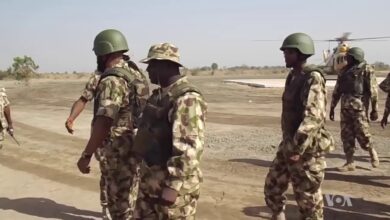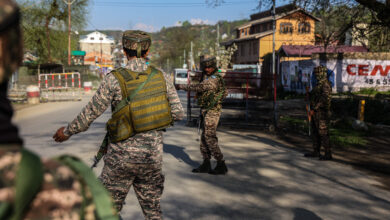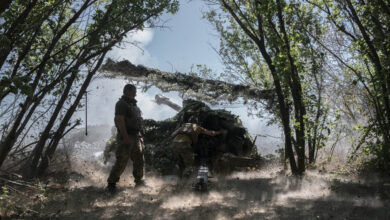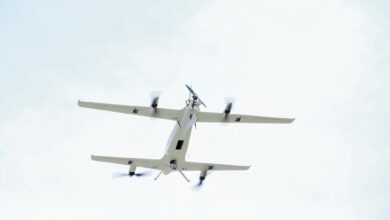Boko Haram militants killed one soldier and injured another in an attack on a military base in Nigeria’s northeast Borno state, military sources said on Tuesday, December 18.
Jihadists in four technicals – trucks fitted with anti-aircraft guns – stormed the base in Mairari village close to the garrison town of Monguno on Monday, briefly seizing it, said the sources who asked not to be identified.
One source said “soldiers were dislodged from the base and some military equipment damaged” in the attack.
“One soldier was killed, one wounded and others missing in action. Search ongoing to recover the missing ones,” he added.
The base was recaptured after reinforcements arrived from Monguno, 10 km (six miles) away.
It is unclear which faction of Boko Haram was responsible for the attack, but the Monguno area has seem a number of significant incidents in recent months.
On November 27, three soldiers were killed in Boko Haram attack on a military base in Cross-Kauwa village, around 18 km from Monguno.
The military said it repelled a Boko Haram attack on a base in Kekeno, eight km from Monguno, on November 16. It was the second attempted takeover of the base in two months – on September 23, troops repelled another Boko Haram attempt to overrun the military base in Kekeno.
In another raid near Monguno on August 3, five people were killed and the village of Gasarwa was razed.
Boko Haram releases images of attack near Maiduguri
On Monday, Boko Haram released images of a Sunday attack on a village near the Borno state capital Maiduguri, Sahara Reporters reported.
Militants burned the village of Maiborinti, 5 km from Maiduguri, sending residents fleeing into the city.
A military officer who did not want to be identified told AFP on Sunday that troops and fighter jets were deployed to the village to push out the militants after “fierce battle.”
The military said on Monday that troops repelled the attack in which a soldier and four insurgents were killed, AFP reported.
Militia leader Babakura Kolo said on Sunday the militants were forced out of the village by troops with aerial support.
“Unfortunately, the terrorists succeeded in setting fire to the village and burning it down completely,” he added.
Surge in Boko Haram attacks
Boko Haram split into two factions in mid-2016 over ideological differences. One is led by Abu Mus’ab Al-Barnawi and largely focuses on attacking military and government targets, while the other, led by Abubakar Shekau, is notorious for suicide bombings and indiscriminate killings of civilians.
Shekau has pledged allegiance to ISIS leader Abu Bakr Al-Baghdadi, but ISIS central gave its formal backing to the Barnawi faction, which is known as Islamic State West Africa Province.
ISWAP has lately intensified its armed campaign, launching a number of major assaults on military targets in Borno and neighbouring Yobe state amid signs of a takeover by more hardline leaders.
There have been dozens of attacks on military bases since July. Most of the attacks have been blamed on ISWAP, or claimed by ISIS as ISWAP attacks.
In the past fortnight attacks have been blamed on both factions.
On December 14, ISWAP fighters attacked a military base in Gudumbali. The Nigerian army said one solder was killed, and ISIS claimed ISWAP fighters killed five troops, while other reports said a dozen or more died.
The same day, Nigerian soldiers were killed in roadside bomb blast near Gamboru thought to have been planted by the Shekau faction.
Boko Haram fighters attacked a military base in Gulumba killing at least two soldiers on December 8. The attack involved a suicide bomber, a hallmark of the Shekau faction.
Three civilians were killed in fighting between troops and ISWAP in Jakana on December 7.
Two military bases were attacked in the Rann and Bama areas of Borno on December 6 and 7.
On December 4, ISWAP fighters launched an assault on a military base in Gudumbali, sparking a fierce firefight in which two soldiers were injured.
The military on November 30 lashed out at the media, saying some media outlets were “creating erroneous impression of the Nigerian Army through inaccurate and false publication of casualty figures.”
The military has even threatened legal action against organisations publishing unofficial figures.
Borno and Yobe states, along with nearby Adamawa state, have born the brunt of nine years of jihadist violence that has claimed 27,000 lives and forced 1.8 million people to flee their homes.
The recent surge in Boko Haram attacks has increased pressure on President Muhammadu Buhari, who was elected in 2015 on a promise to defeat the Islamists and has repeatedly said they are virtually defeated. His administration wants to show it is winning the fight against Boko Haram ahead of a presidential election in February at which he will seek a second term in office.
With reporting from AFP












